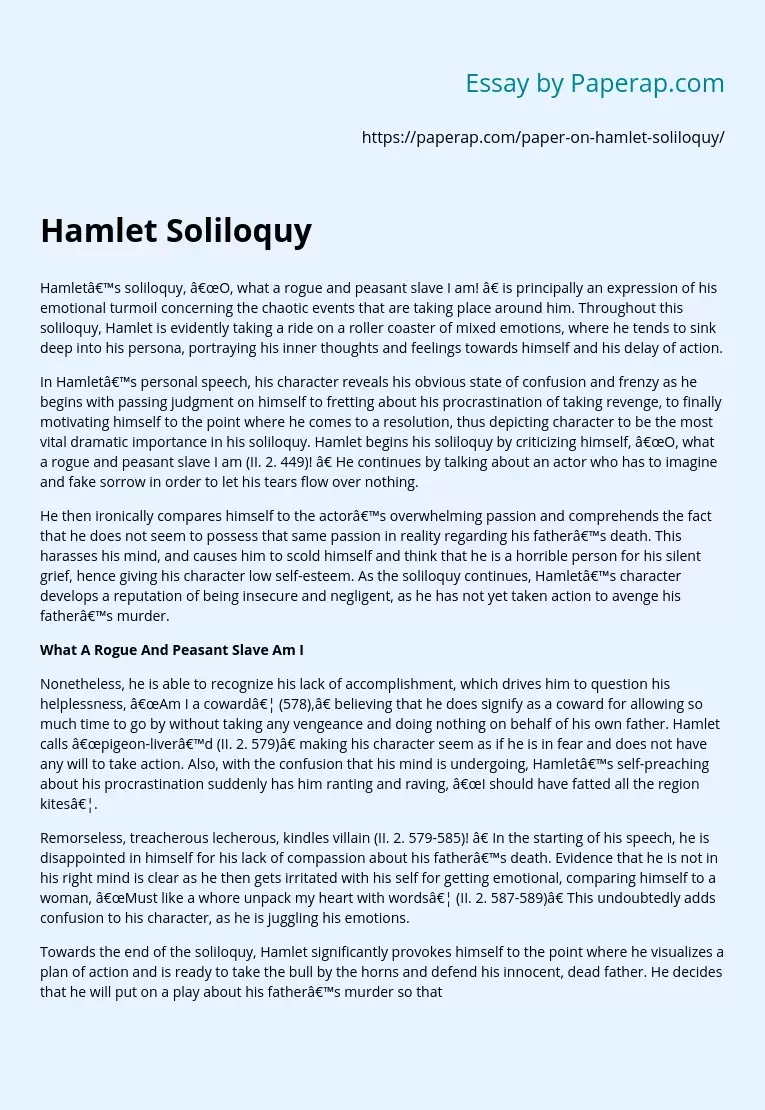Hamlet Soliloquy
Hamlet’s soliloquy, “O, what a rogue and peasant slave I am! ” is principally an expression of his emotional turmoil concerning the chaotic events that are taking place around him. Throughout this soliloquy, Hamlet is evidently taking a ride on a roller coaster of mixed emotions, where he tends to sink deep into his persona, portraying his inner thoughts and feelings towards himself and his delay of action.
In Hamlet’s personal speech, his character reveals his obvious state of confusion and frenzy as he begins with passing judgment on himself to fretting about his procrastination of taking revenge, to finally motivating himself to the point where he comes to a resolution, thus depicting character to be the most vital dramatic importance in his soliloquy.
Hamlet begins his soliloquy by criticizing himself, “O, what a rogue and peasant slave I am (II. 2. 449)! ” He continues by talking about an actor who has to imagine and fake sorrow in order to let his tears flow over nothing.
He then ironically compares himself to the actor’s overwhelming passion and comprehends the fact that he does not seem to possess that same passion in reality regarding his father’s death. This harasses his mind, and causes him to scold himself and think that he is a horrible person for his silent grief, hence giving his character low self-esteem. As the soliloquy continues, Hamlet’s character develops a reputation of being insecure and negligent, as he has not yet taken action to avenge his father’s murder.
What A Rogue And Peasant Slave Am I
Nonetheless, he is able to recognize his lack of accomplishment, which drives him to question his helplessness, “Am I a coward… (578),” believing that he does signify as a coward for allowing so much time to go by without taking any vengeance and doing nothing on behalf of his own father. Hamlet calls “pigeon-liver’d (II. 2. 579)” making his character seem as if he is in fear and does not have any will to take action. Also, with the confusion that his mind is undergoing, Hamlet’s self-preaching about his procrastination suddenly has him ranting and raving, “I should have fatted all the region kites….
Remorseless, treacherous lecherous, kindles villain (II. 2. 579-585)! ” In the starting of his speech, he is disappointed in himself for his lack of compassion about his father’s death. Evidence that he is not in his right mind is clear as he then gets irritated with his self for getting emotional, comparing himself to a woman, “Must like a whore unpack my heart with words… (II. 2. 587-589)” This undoubtedly adds confusion to his character, as he is juggling his emotions.
Towards the end of the soliloquy, Hamlet significantly provokes himself to the point where he visualizes a plan of action and is ready to take the bull by the horns and defend his innocent, dead father. He decides that he will put on a play about his father’s murder so that he can see Claudius’ reaction of guilt. Along with his sudden ambition, Hamlet begins to feel an uncertainty about the ghost, thinking that it could possibly be a demon trying to take advantage of his weakness and sorrow.
However, with little thought to this, he then abruptly shifts his mind back to his plan, “the play’s the thing, Wherein I’ll catch the conscience of the king (II. 2. 606-607)” Due to Hamlet’s sudden resolution, his character essentially gains determination and confidence. Thus, character is the most vital dramatic importance of Hamlet’s soliloquy. The confusion that he is in is evidently expressed though his character with his mixture of emotions. He seemed to be very offensive towards himself in the beginning for not showing any grief regarding his father’s death.
He then sulked about his delay of action, which made him emerge with rage and compassion, and was once again irritated with himself for showing that much emotion. After that, Hamlet finally comes to a solution about avenging his father’s murder and capturing his uncle’s guilt. While excited about his plan, he starts to think if he should doubt the ghost or not, and then finishes off by once again stating his objective. From beginning to end, Hamlet’s character went on a mental voyage from self-disgust to self-assured.
Hamlet Soliloquy. (2019, Dec 05). Retrieved from https://paperap.com/paper-on-hamlet-soliloquy/

